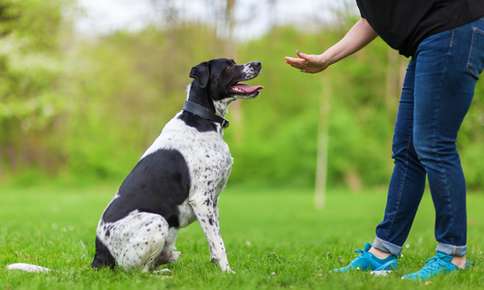
6 Tips to Help You Learn How to Train Your Pet
If you've ever tried to teach your pet a command or trick, you know that training isn't always as easy as the experts on YouTube videos make it look. These six tips just may make the training process less stressful and more productive.
Keep Training Sessions Short
Long training sessions don't deliver better results and may only frustrate both of you. Schedule training sessions for five to 10 minutes at most. A few short sessions throughout the day may produce better results than one long session.
Eliminate Distractions
Find a calm, quiet area of your home to train your pet. An audience can be distracting when you first begin training. Although you may want to eventually ask other members of your household to participate in training, the one-on-one approach may be best at first.
Pay Attention to Your Pet's Signals
Just like people, pets find it hard to concentrate if they're tired, hungry or hot. If your pet seems lethargic or loses interest in training, postpone the session to another time. Your dog or cat is more likely to retain the information when well-rested and fed.
Similarly, don't start a training session if you're tired, hungry or irritable. If you're not in the mood to train, you may become impatient, which can derail the training process. Training should be a fun experience for both you and your pet.
Put Yourself in Your Pet's Paws
Puppies and kittens don't innately understand English the moment they're born. After a few weeks or months, they'll begin to associate words and gestures with actions. If you say "out" and pick up your pet's leash, he or she will eventually realize that the word means that it's time for a walk or outside playtime.
Imagine if you found yourself in a foreign country unexpectedly. You might only understand a few words of the language initially, but you would become more fluent through practice and repetition.
Although your pet may already recognize a variety of words, the words you use for training may be unfamiliar. It may take some time until your cat or dog understands exactly what you mean when you say "roll over" or "sit-stay." Some pets will make the connection in just two or three training sessions, while others may need more practice.
Offer the Tastiest Treats
Just like people, pets appreciate perks for a job well done. You may prefer a raise or bonus to a chicken- or liver-flavored snack, but your pet will be perfectly happy with a treat.
Giving your pet a treat after he or she responds to a command is an excellent way to reinforce positive behavior. The same old treats your pet receives every day won't make the same impact as flavorful treats that are only offered during training sessions. Offering a variety of tasty treats will help keep your pet motivated to learn new commands and tricks.
Teach These Commands First
Before your pet can master an Instagram-worthy trick, he or she needs to learn sit, the basic command that provides a foundation for all other commands and tricks.
Teaching sit isn't difficult. Place a treat in your hand and hold it slightly over your pet's head while giving the sit command. As your pet looks up at the treat, he or she may automatically sit. If not, gently push his or her hind end down while repeating "sit," then offer a treat. Repeat the process a few times every day.
After your pet masters sit, work on other commands, such as come, leave it and sit-stay. Sit-stay is a particularly helpful command. It can stop your furry friend from dashing out into traffic and makes grooming and veterinary visits easier.
Whether you have a question about behavior or concerns about your pet's health, we're here to assist you. Contact us and let us know how we can help you.
Sources:
Cesar’s Way: 5 Essential Commands You Can Teach Your Dog
https://www.cesarsway.com/5-essential-commands-you-can-teach-your-dog/
Petfinder: How to Teach a Cat Tricks
https://www.petfinder.com/cats/cat-behavior-and-training/how-to-teach-a-cat-tricks/
Association of Professional Dog Trainers: The Benefits of Training
